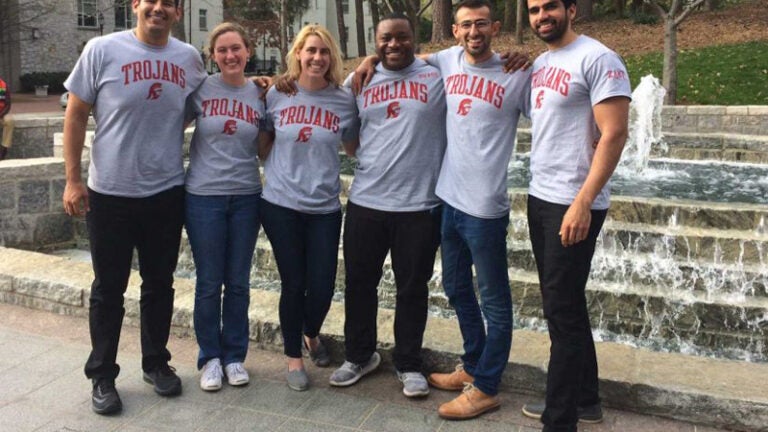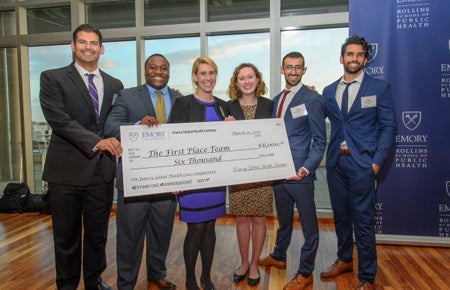
USC team wins global health case competition
Students from four USC schools, including a human biology major at USC Dornsife, won the international Emory University Global Health Case Competition, joining the elite few to have clinched first place in the event’s seven years.
With a $6,000 check in tow, the students returned to Los Angeles after a surreal whirlwind week in Atlanta synthesizing ideas into their research-backed, million-dollar proposal — and presenting it to global experts.
The team included Cristina Gago, who is earning her B.S. in human biology as well as a progressive MPH in global health leadership from Keck School of Medicine of USC; Master of Public Health students Ashley Millhouse and Hrant Gevorgian ’14 (Keck School of Medicine); Master of Public Administration students Brantynn Washington and Julian Cernuda (USC Price School of Public Policy); and Zaki Hasnain M.S. ’14, a doctoral candidate in mechanical engineering (USC Viterbi School of Engineering).
A week before competition day, 24 student teams from Australia, Canada, Denmark and the United States were tasked to propose programs addressing children’s mental health needs in Liberia. The West Africa nation is expanding its mental health services in the wake of civil war and Ebola.
Setting aside classes, assignments, jobs and other commitments, the USC students put their lives on hold for the competition.

From left, Julian Cernuda, Brantynn Washington, Ashley Millhouse, Cristina Gago, Hrant Gevorgian and Zaki Hasnain. Photo courtesy of Emory Global Health Institute.
“A lot of times in classes and lectures, we’re really focused on learning material, but we don’t necessarily have the ability to apply it in a very real-world sense, and this allows us to do that,” Gago said.
Deriving inspiration
To develop their proposal, they drew inspiration from several USC researchers’ storytelling and narrative public health projects. They also used examples from other successful “edutainment” and storytelling projects like Burka Avenger, a Pakistani TV series promoting women’s empowerment, and Coaniquem’s Healing Cloud Project, a Chilean burn prevention campaign.
With guidance from professors and faculty mentors, the team developed its proposal for a “data-driven, gamified mental health platform” called Reaching Resilience. Through transmedia messaging, role-playing, advocacy and mentorship, the program would aim to build reliance among children struggling with depression, anxiety and autism.
The competition in Atlanta was intense, the students said.
“All of our group members are either working full-time, part-time or heavily engaged in various academic organizations,” said Millhouse, who is working on her MPH degree while employed as a hospital systems account manager at the American Cancer Society. “This meant that we didn’t have an entire week to put our phones on silent and devote to creating a team design.”
But their varied skill sets, perspectives and team-player attitudes carried them through, even when they had to rework their slides the night before the presentation, Millhouse said. When they made it to the final round, they were given 45 minutes to adjust their presentation to incorporate a “twist” in the case: accommodating an American philanthropist’s interests into their proposal.
Judges for the competition included mental health and public health experts from the Emory University School of Medicine, The Center for Victims of Torture in Atlanta, The Carter Center, Duke University, Centers for Disease Control and Doctors Without Borders.